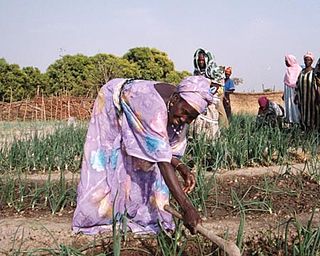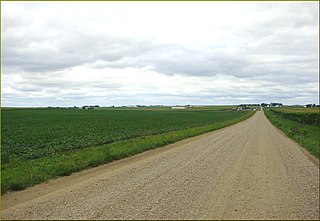Related Research Articles

The Federal Farm Loan Act of 1916 was a United States federal law aimed at increasing credit to rural family farmers. It did so by creating a federal farm loan board, twelve regional farm loan banks and tens of farm loan associations. The act was signed into law by President of the United States Woodrow Wilson.

The United States Department of Agriculture (USDA) is the federal executive department responsible for developing and executing federal laws related to farming, forestry, rural economic development, and food. It aims to meet the needs of commercial farming and livestock food production, promotes agricultural trade and production, works to assure food safety, protects natural resources, fosters rural communities and works to end hunger in the United States and internationally. It is headed by the Secretary of Agriculture, who reports directly to the President of the United States and is a member of the president's Cabinet. The current secretary is Tom Vilsack, who has served since February 24, 2021.

An agricultural cooperative, also known as a farmers' co-op, is a cooperative in which farmers pool their resources in certain areas of activity.
The Commodity Credit Corporation (CCC) is a wholly owned United States government corporation that was created in 1933 to "stabilize, support, and protect farm income and prices". The CCC is authorized to buy, sell, lend, make payments, and engage in other activities for the purpose of increasing production, stabilizing prices, assuring adequate supplies, and facilitating the efficient marketing of agricultural commodities.
A loan guarantee, in finance, is a promise by one party to assume the debt obligation of a borrower if that borrower defaults. A guarantee can be limited or unlimited, making the guarantor liable for only a portion or all of the debt.
The Farm Credit System (FCS) in the United States is a nationwide network of borrower-owned lending institutions and specialized service organizations. The Farm Credit System provides more than $304 billion in loans, leases, and related services to farmers, ranchers, rural homeowners, aquatic producers, timber harvesters, agribusinesses, and agricultural and rural utility cooperatives.

AgFirst, part of the US Farm Credit System, serves as a wholesale lender and business-service provider to a network of local farm credit associations in 15 southern and eastern states, Washington, D.C., and Puerto Rico. It was formed in 1995 by the merger of the Farm Credit Bank of Baltimore and the Farm Credit Bank of Columbia. The lender is cooperatively owned by 22 local associations. These associations, operating as Farm Credit and Ag Credit associations, provide real estate and production financing to about 80,000 farmers, agribusinesses, and rural homeowners.

Cooperative banking is retail and commercial banking organized on a cooperative basis. Cooperative banking institutions take deposits and lend money in most parts of the world.
American Farmland Trust (AFT) is a non-profit organization in the United States with a mission to protect farmland, promote environmentally sound farming practices, and keep farmers on the land. AFT is staffed by farmers, policy experts, researchers, and scientists, and governed by a board of directors. It's headquarters are in Washington, D.C., and it has regional offices throughout the country. AFT also runs the Farmland Information Center, an online collection of information on farmland and ranchland protection and stewardship established as a public-private partnership with the USDA Natural Resources Conservation Service.

First City Monument Bank (FCMB), a member of FCMB Group Plc, is a financial services holding company headquartered in Lagos. FCMB Group Plc has nine subsidiaries divided among three business groups: commercial and retail banking, investment banking, and asset and wealth management. As of December 2020, the Group's total assets were valued at US $5 billion.

The Food, Conservation, and Energy Act of 2008 was a $288 billion, five-year agricultural policy bill that was passed into law by the United States Congress on June 18, 2008. The bill was a continuation of the 2002 Farm Bill. It continues the United States' long history of agricultural subsidies as well as pursuing areas such as energy, conservation, nutrition, and rural development. Some specific initiatives in the bill include increases in Food Stamp benefits, increased support for the production of cellulosic ethanol, and money for the research of pests, diseases and other agricultural problems.

AgStar Financial Services is a US Farm Credit System Agricultural Credit Association (ACA) that delivers a wide range of farm and rural credit programs and services in 67 counties located in Minnesota and northwest Wisconsin. AgStar provides financial products including agricultural loans, leases, crop insurance, life insurance, and home mortgages. The financial services offered include appraisals, money market accounts, online banking, and other consulting services.
The Farm Credit Council is the national trade association of the Farm Credit System, a U.S. network of borrower-owned cooperative lending institutions and service organizations. The Farm Credit Council represents the Farm Credit System in legislative and regulatory lobbying before the United States Congress government and state legislatures.

The Farm Credit Act of 1971 recodified all previous acts governing the Farm Credit System (FCS), a cooperatively owned government-sponsored enterprise (GSE) that provides credit primarily to farmers and ranchers.
The Student Sustainable Farm at Rutgers is located at Rutgers' Horticultural Research Station in New Brunswick, New Jersey, on the G. H. Cook campus of Rutgers University.

Texas Farm Bureau, Texas's largest farm organization, represents the interests of agricultural producers and rural communities across Texas as the "Voice of Texas Agriculture." Texas Farm Bureau's grassroots structure begins in local communities across the state of Texas. The non-profit organization's direction and decision making are dictated by its members.

The Louisiana Farm Bureau Federation (LFB) is a state chapter of the United States's largest general farm organization representing farmers, ranchers, and rural residents. The organization provides assistance toward the development and prosperity of Louisiana agriculture. It is a private, non-profit, non-governmental agency established in 1922 to bring a voice to Louisiana farmers and their families. It is based in Baton Rouge, Louisiana.
A loan waiver is the waiving of the real or potential liability of the person or party who has taken out a loan through the voluntary action of the person or party who has made the loan. Examples of loan waivers include the Stafford Loan Forgiveness program in the United States and the Agricultural Debt Waiver and Debt Relief Scheme in India
Larry Steckline is a prominent Kansas broadcasting entrepreneur, and radio and television personality, particularly known for his Kansas agriculture news/feature/commentary programs. His company, Steckline Communications—formerly known as the Mid-Kansas Ag Network—provides various media services, including agricultural news syndicated to radio and television stations throughout Kansas. Steckline has also owned and operated 27 Kansas and Oklahoma radio stations.

Farmers' suicides in the United States refers to the national occurrences of farmers taking their own lives, largely since the 1980s, partly due to their falling into debt, but as a larger mental health crisis among U.S. agriculture workers. In the Midwest alone, over 1,500 farmers have taken their own lives since the 1980s. It mirrors a crisis happening globally: in Australia, a farmer dies by suicide every four days; in the United Kingdom, one farmer a week takes their own life; and in France it is one every two days. In India more than 270,000 farmers have died by suicide since 1995.
References
- ↑ Profile: "Farm Credit of New Mexico", Investing/BusinessWeek.com, accessed August 27, 2008.
- 1 2 "Ag lender puts up millions to stem loss of young farmers", New Mexico Business Weekly, April 15, 2005, accessed August 27, 2008.
- ↑ "Earnings way up at Farm Credit System lenders in NM", New Mexico Business Weekly, December 31, 2004, accessed August 27, 2008.
- ↑ Funding for Young Farmers and Ranchers Sprouted in '02", New Mexico Business Weekly, July 18, 2003, accessed August 27, 2008.
- ↑ "Farm Credit gives $250,000 for endowed scholarship at NMSU" Archived 2013-01-25 at archive.today , High Plains/Midwest Ag Journal, December 15, 2005, accessed August 27, 2008.